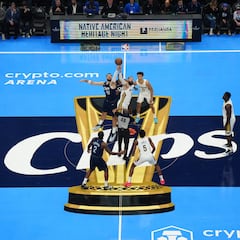Why is point differential so important in the NBA In-Season Tournament?
In the National Basketball Association’s In-Season Tournament, the team with the most wins will be declared the group-stage winner.


However, tiebreakers will come into play if two or more teams have the same number of wins. The first tiebreaker is the head-to-head record between the tied teams, and the second tiebreaker is the points differential. There are a few more tiebreakers, but they are not relevant to this context.
Some “Cupsplaining” follows
During the In-Season Tournament, teams in the same group do not play simultaneously. This means that a team may already know the result of their group before their last group stage game. For example, the Bulls and Raptors play their final group stage game after all other games in their group have finished. This gives a team, let’s call them Team A, an advantage as they would know exactly what they need to do to win their group.
Let’s say Team A needs to win their last game to force a 3+ way tie for first and win by 6 or more points. In this case, there could be no clear head-to-head winner as all three teams could be 1-1 against the other two. If it were a two-way tie for first, there would be a clear head-to-head winner, and it would not go to the points differential tiebreak.
Now, let’s say that at the end of the game, Team A is leading by 2 points with 3 seconds to go, and they have the ball. They have to win by 6+ to win the group and advance. However, the other team isn’t fouling them to cause a 4+ point play. So, what does Team A have to do? They have to score in their own basket to force overtime. That’s their only chance of advancing. In that case, they cause a tie, but because the overtime points differential still adds up, they can win by 6+ overtime to advance. Of course, if the opposing team is also trying to avoid losing by 6+ or more to advance, they would also try to prevent Team A from gifting themselves 2 points. In other words, the two teams would go in opposite directions.
DeMar DeRozan being ejected for getting upset with Toronto for trying to score late in the in-season tournament game pic.twitter.com/0VAGqzqSFt
— NBA Dramatics (@NBADramatics) November 25, 2023
Related stories
The only risk for Team A is that they could lose a team they would have won for the regular season standings had they not scored in their basket. However, one game in the regular season standings is worth much less than the monetary reward of winning the tournament, so there isn’t much risk.
This scenario has occurred throughout sports history. There was once a famous soccer game (Barbados against Grenada, 4-2, on January 27, 1994) where the points differential tiebreak caused a ridiculous ending where one team tried to score both goals, and the other tried to prevent that. It also happens in the NFL to a different extent (not points differential but time). In some situations, a defense allows the other team to score a touchdown rather than wind down the clock to get a shot themselves.

